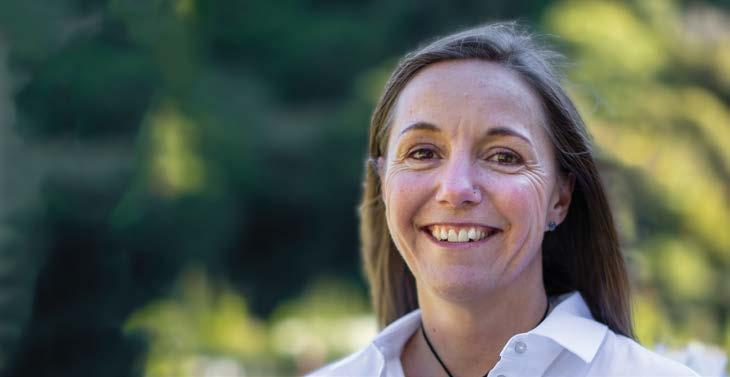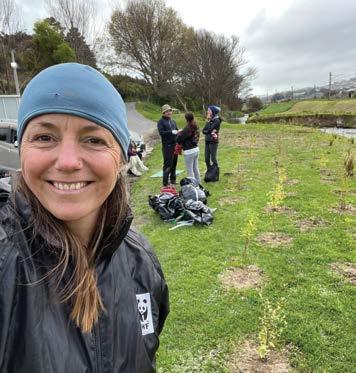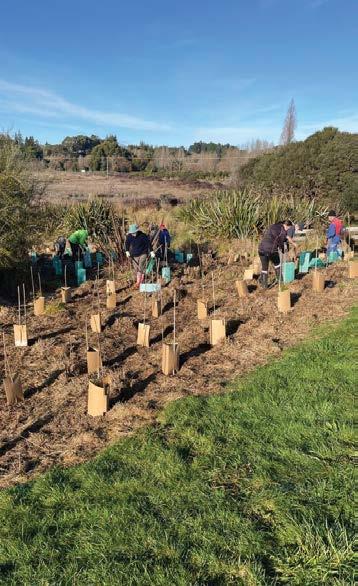
6 minute read
A different approach to growing
Livia Esterhazy has been appointed as the new programme director for A Lighter Touch
Livia Esterhazy, whose career includes executive roles in banking, marketing, advertising and a not-for-profit environmental organisation, is the new programme director for A Lighter Touch.
Elaine Fisher
Livia was appointed to the role in October. The gamechanging multi-year partnership programme between government and industry addresses the challenge of meeting consumer demands for quality food while also being gentle on the environment.
“Food production is one of the biggest environmental issues we face globally,” Livia says. “The use of chemicals, pest management and soil health need a different approach. This is why I’m so thrilled to be joining this innovative partnership with 15 of New Zealand’s leading commercial product groups and the government all focused to transform how fruit, vegetable and arable crops are grown with a lighter environmental touch.” The governance group of the $25.5m, Sustainable Food and Fibre Futures Fund (SFFF) undertook an extensive search for a high-calibre director, which resulted in Livia’s appointment. “The programme is pleased to have been able to appoint a person of Livia’s experience and passion to lead it into its next stage, where the projects underway will start to deliver sustainable pest and disease management programmes for the commercial horticulture and arable sector,” says A Lighter Touch independent chair, Dr David Tanner. Livia says the environment needs a lot of support. “We all need to make changes if we are to continue to have a planet we want to live on,” she says. “But I also understand that it makes no sense to come up with programmes which are not economically viable for growers. “A Lighter Touch is not about completely stopping the use
of agrichemicals. It is about a wholistic approach to pest and disease management. “It is an exciting programme which offers huge opportunities for growers in New Zealand to show the world how food can be produced sustainably and to also meet the global pressures which are coming, including around how consumers want their food produced. “If we are not well prepared for those changes it could be a disaster as we are a food producing nation.”
A Lighter Touch is not about completely stopping the use of agrichemicals. It is about a wholistic approach to pest and disease management
Collaboration and networking among growers from different industry sectors are among the programme’s strengths. “When you bring unlikely friends to the table, magic happens,” Livia says. “Bring a diverse group of growers together and it’s likely many are facing the same issues and problems. It’s also likely some of these have already been resolved somewhere else, but while you remain in your own silos you will never know.” There will be early adopters of the A Lighter Touch programme. Telling their stories, warts and all, will be important. “Those stories must be honest, transparent and inspiring but not glossy comms pieces because growers are very astute and will see through that,” Livia says. “It is important to share the wins and also the failures because there is much to be learnt and money saved from understanding failures.” The programme has a seven-year time frame and Livia is confident that it will meet many of its objectives in that time.
“We won’t get every grower adopting A Lighter Touch within seven years, but we will be well on the way. Perhaps A Lighter Touch ‘Version Two’ will be required, but the ultimate aim is to make the programme redundant because the entire industry has adapted to have a lighter touch on the environment.”
Livia recognises the considerable pressures growers are already under, especially from climate change regulations. “Everything now needs to be done at a faster pace, but the knowledge around climate change is not new. If these regulations were implemented 20 years ago, they could have been introduced at a much slower pace. All of them cost money. It’s not an easy time for growers. Through A Lighter Touch we aim to create change a little more slowly.” Livia, who now lives at Mapua in the Nelson Tasman District, is the daughter of a French mother and HungarianAustralian father.

“My father was a hotelier who opened hotels around the world, so we travelled rather like a military family,” she says. “I was born in India and then moved to Singapore, Korea, Pakistan, Melbourne and then Sydney. By the time I was 11 Mum said ‘enough’ so we stayed in Sydney.” Young Livia’s career ambition was to become a commercial pilot, but a flight in the cockpit of a commercial aircraft to Bali changed her mind. “I was totally bored.” Instead, she studied for a bachelor’s degree in marketing and finance with Honours at the University of New South Wales.
What followed included diverse roles such as: Senior executive marketing communications for the Commonwealth Bank; managing director of Ogilvy & Mather in Wellington; brand manager for Kiwibank; general manager Saatchi & Saatchi; non-executive board member of The Treasury New Zealand; chair of the board of Asia Pacific Growth Strategy and most recently, chief executive of the World Wildlife Fund, New Zealand. “Among the aspects of my new role that I know I’m really going to love is meeting growers face-to-face, learning about what they grow and how they grow it, and being part of a programme which will make a real difference to them and at the same time, the environment,” Livia says.
To find out more about A Lighter Touch, visit: https://a-lighter-touch.co.nz/.

Planting trees in Mapua to increase the habitat for the Banded Rail (Moho Pereru) bird
A Lighter Touch – gentle on the environment
A Lighter Touch is a $25.5 million, seven-year, programme jointly funded by government and industry. The programme will address the challenge of meeting consumer demands for safe food that is produced under sustainable pest management programmes while also being gentle on the environment. Government funding is via the Ministry for Primary Industries Sustainable Food and Fibre Futures programme. A Lighter Touch will focus on understanding and better managing aspects of agroecosystems that lead to increased levels of pests and diseases, and how to integrate more sustainable crop protection practices. Understanding the agroecosystem and reducing the opportunity for pests to thrive will reduce the need for crop protection interventions. There will be increased use of biopesticides and biological control agents, with these tools becoming embedded into crop protection programmes. Agrichemical residues in exported crops and products, overall agrichemical use and resistance risk will all be reduced and be a marketing advantage for New Zealand products. The plant-based food sector, incorporating horticulture, arable cropping and wine production, generates over $8 billion annually. New Zealand horticulture is valued at over $6 billion, with $3.4 billion in exports, produced by over 5500 commercial fruit and vegetable growers. The arable industry contributes $1.4 billion to the economy from domestically consumed grain and food crops, and seed exports. The wine industry produces $1.9 billion of wine for domestic and export sale, with all but $54 million exported.
In our world of twigs and roots pedigree is everything.
As we all know, in the fruit growing industry ultimately everything stems from a twig. We have alliances with some of the world’s best new fruit variety developers and rootstock breeding programmes. These relationships and our continual search for the best cultivars puts us at the forefront of global variety and rootstock development in New Zealand. Our unique capability across a wide variety of crops and our focus on matching varieties and rootstocks to conditions allows us to offer real, informed advice. Call: Kate Marshall, 0274 201 033, kate@waimeanurseries.co.nz Jeff Sandford, 0274 201 003, jeff@waimeanurseries.co.nz

www.waimeanurseries.co.nz










